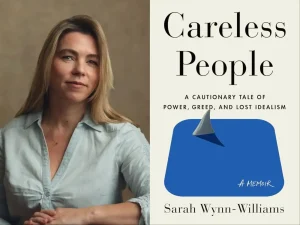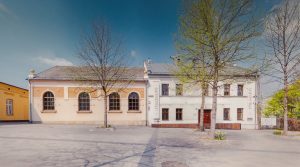A decade ago, when Naomi Azrieli and her late father David first put out a call for unpublished memoirs by Holocaust survivors in Canada with the intention of preserving and sharing them, they were not sure what the response would be.
They soon realized the Azrieli Foundation would be fulfilling an unmet need: the desire of so many to tell what happened to them during the war and afterward – before it was too late.
“We received manuscripts in English, French, Yiddish, Polish, Russian and Hungarian,” Naomi said at an Oct. 26 celebration of the Holocaust memoirs publishing program’s 10th anniversary.
“Some were typed, some were handwritten. They were full length, and even poetry,” she said.
Over its history, the program has received more than 180 manuscripts, and numberless other types of Holocaust-related submissions. To date, 62 titles by 42 authors have been published (some are available in English and French).
The selected manuscripts are turned into highly readable stories and published as high-quality paperbacks, containing photos and illustrations, by a team of editors, translators and artists.
In recent years, videos have been added. Interviews with the authors are enhanced with animation and dramatic narration in these short films.
The books and videos are given festive launches with author tributes and signings.
Education is the program’s main goal and the books are made available free of charge to anyone, with high schools, colleges and libraries the target audience.
In recent years, the Toronto-based program has been increasing its outreach in Quebec. This year alone, 20,000 books were distributed in the province, said Azrieli, the foundation’s chair and CEO. Across the country, close to 65,000 books have been sent out – so far.
Eleven new editions were unveiled at the celebration, including Alone in the Storm (Seul dans la tourmente) by Leslie Vertes and Where Courage Lives (Les Lieux du courage: Ils m’appelaient Marie) by Muguette Myers, both of Montreal, who spoke on behalf of their fellow authors.
The evening, held at Montreal’s Sofitel Hotel, also saw the announcement of a new technological tool intended to deepen understanding of the Holocaust, according to particular interests.
Azrieli unveiled Re:Collection, an interactive multimedia platform, which is expected to be fully operational at the end of the year for both desktop and mobile devices. Guests had a chance to try it themselves on tablets provided, with the assistance of the program’s digital platform manager Tim MacKay. (The Azrieli Foundation held a similar event Oct. 22 at the Carlu in Toronto.)
Users can explore the first-hand accounts of survivors – 15 of the authors are included for now – through memoir excerpts, video clips, photos and many other materials collected. They can relate these individual stories to historical themes, such as the prewar life, ghettos, deportation and the camps, as well as more universal themes like family, religion, discrimination and immigration.
This platform also allows for connections to be made among the survivors who share common experiences. Timelines and maps can be created to put information in context.
“We are honoured that they have entrusted us with their legacies,” said Azrieli.
Her Polish-born father, who passed away in 2014, regarded memoir publication as “a second liberation” for his fellow survivors, freeing them to tell their stories without fear.
These first-hand accounts provide lessons for youth today, the Azrieli Foundation believes, not only in the dangers of racism, but in courage and resilience.
Vertes, a vigorous 91 who was born into a poor family in Hungary, said he hesitated for many years to write his memoirs, worried about his “broken English” and the buried memories it would awaken.
“It took me 18 months of sleepless nights to finish,” said Vertes. He is grateful for the professional polishing the Azrieli Foundation gave his manuscript, and especially the patience and kindness of its staff. Vertes figures more than 800 phone calls and more than 4,000 emails were exchanged before the book was off the press.
As the title indicates, Vertes felt completely alone during the Holocaust. A shoemaker by trade, Vertes was 20 in 1944 when the Nazis occupied Hungary.
He escaped a forced labour detail and survived by assuming a false identity. His liberation was short-lived: he was captured by the new Soviet regime and forced into two years of hard labour.
He became very ill and remembers seeing after his recovery the grave that had been dug for him.
After the 1956 revolution, Vertes and his wife Vera and their baby son George made a new, but not easy, life in Montreal. The freedom from fear was what he most appreciated here. Vertes’ greatest joy is that George, their only child, became a doctor, and he now has three grandchildren.
Last month, Vertes received the Governor General’s Caring Canadian Award in recognition of his long volunteer service, speaking to young people and helping many survivors apply for German reparations.
Myers, née Szpajzer, was born in Paris in 1931 to Polish parents. Her memoir is as much a tribute to her strong and resourceful widowed mother as it is about herself, she said.
“My brother and I survived thanks to her,” said Myers. Her mother hid with the children, her mother and a sister in the village of Champlost where the people sheltered them. But her mother decided to return to Paris in the summer of 1940 just as the city was in chaos.
Myers, who immigrated to Montreal in 1947 and later became a translator, returned to Champlost 10 years ago to honour four residents as Righteous Among the Nations for hiding her family.
Among the other 11 new titles is the French translation of Montrealer Arthur Ney’s memoir L’Heure W. As a young teen, Ney was caught up in both the Warsaw Ghetto Uprising and the Warsaw Uprising.






